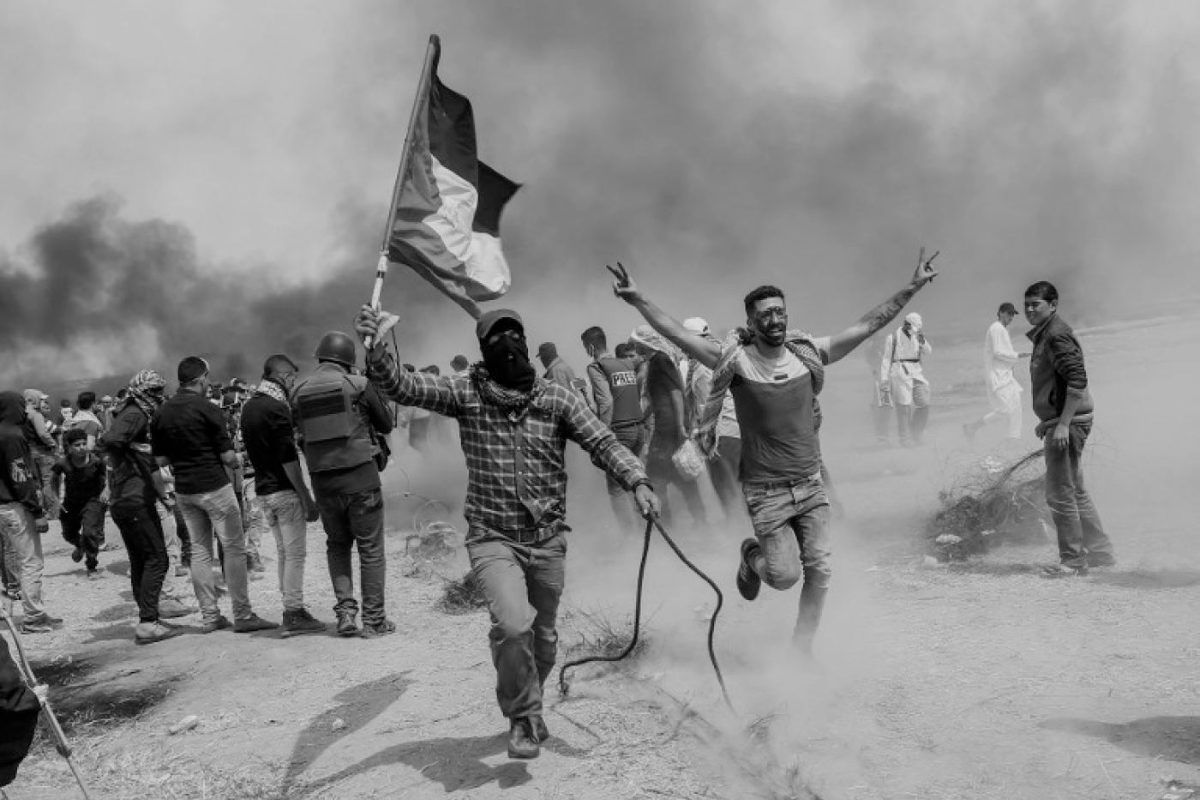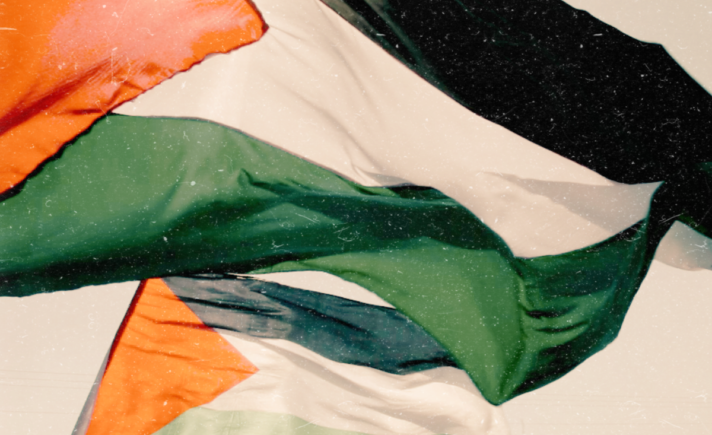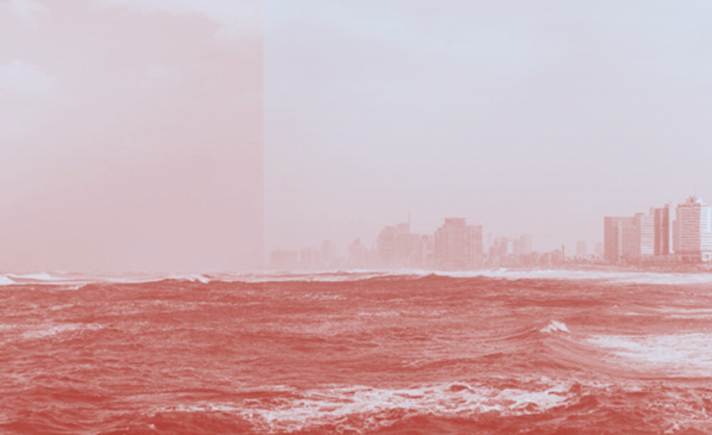Since Hamas’ surprise attack on October 7, which has been followed by the nightmarish Israeli war on Gaza, liberal and left-liberal commentators have insisted that we must condemn both sides equally for their violations of humanitarian international law and for ignoring the distinction between civilians and fighters. This article is an attempt to think through this argument.
Let’s state the facts: Israel has breached every rule of international humanitarian law. The siege of Gaza, cutting off power and supplies, blocking outside relief from entering, targeting hospitals and medical workers, firing rockets without prior warnings – all of this is a replay of Israel’s casual disdain for anything resembling so-called “humane war”, not to mention the targeting of civilians. This will not be the first time that Israel has proven its absolute indifference to international law in general. I find it absurd to even have to remind everyone of this: this occupation that has lasted for close to 60 years now has been illegal from day one. There is something too banal about stating those facts. Perhaps it is their obviousness that makes them unremarkable; after all, the most familiar is the hardest to notice.
Meanwhile, Hamas is accused of terrorist acts for its killing of Israeli civilians, kidnapping them, and holding them as hostages. There are some indications of cruel treatment, rape and mutilation, although far too many of these later turned out to be unverified. War is hellish enough, and this war in particular is a hell on earth. Hunting for every gruesome and infernal scene in order to stoke another apocalyptic war against “terrorists” who are deemed outside humanity altogether is nothing short of participation in a crime at this point. Let us remember that the same sort of accusations were leveled previously against the Palestine Liberation Organization and the Popular Front for the Liberation of Palestine, and therefore it is also ahistorical to suggest today that those accusations are triggered by Hamas’ religious, eliminationist or anti-Semitic outlook. Before Hamas, there was a secular nationalist anti-colonialism embodied in those other organizations, which were either weakened or co-opted by the colonial regime. So the attempt by Western power and its media apparatus, including Joe Biden himself, to make a connection between Hamas, Palestinians, terrorism, Islam and “beheading children” is another episode of a very long, tiresome history.
Today, young supporters of Palestinian resistance are calling on the tradition of national liberation war and armed struggle in order to justify their allegiances in the face of Western accusations of terrorism. Young supporters of Palestine, my generation, are invoking Frantz Fanon (especially The Wretched of the Earth and the famous first chapter “Concerning Violence”), Algeria and Haiti. This is a remarkable discursive development. For decades now, following Oslo, there have been some attempts within secular groups supportive of the Palestinian cause to move away from this legacy and to take on the so-called South Africa model of anti-apartheid, which suggested civil disobedience as another paradigm of anti-colonial resistance (at least right before the fall of apartheid, although a lot of violence was still involved), while the question of armed struggle was bracketed out temporarily; the rise of the Boycott, Divestment and Sanctions movement is a case in point here. Even Edward Said himself spoke out against the PLO’s terror tactics, arguing that those have hurt the Palestinian cause in the long run.
But now, we’re far less ashamed to admit that we read Fanon.
Re-reading Fanon in the backdrop of the warzone that Gaza is today orders a special attention to the civilian category in humanitarian law. Given this symbolic universe that we’re now inhabiting, some voices have also made the claim that “no settler is a civilian.” I take this to mean that “every settler is on reserve for war.” I will speak below about some limitations of this argument. This argument is not the best or most effective or the clearest, but it is far less egregious than painting one’s enemy as a “human animal.” At least when you claim that a settler is not a civilian, you’re not questioning their humanity nor their capacity to fight. Meanwhile, the humanity of all Palestinians has been questioned, in the name of humanitarian law. Palestinians are not granted the dignity of even being “non-civilians” (that is, combatants), nor are they granted the possibility of being “civilians” (that is, citizens of a polity). They are denied both civilian and fighter status and degraded to the status of radical evil. This is the sad consequence of humanitarian thinking. It easily becomes a civilizationist standard through which to decide who is human and who is not, who is good and who is evil. This is why when military and humanitarian thinking come together, we end up with a religious and apocalyptic imaginary, not ordinary military combat. Therefore, when liberals demand that we “condemn both sides” for ignoring civilian status, they are not exactly wrong or immoral, but it surely lacks tact given the context we’re in right now, in which Palestinians are not only denied civilian status, but human status. Timing, context, thoughtfulness, and decency: those are just as important as the “consistency” liberals are demanding that we follow. And by the way, consistency is not enough to make a position moral.
As an aside, even if the civilian/combatant distinction has a moral value that must be retained, one should note that its descriptive value is much more restricted. At least under asymmetric wars (and all wars of liberation are asymmetric and consciously so) the civilian/combatant distinction works better with state actors than non-state actors. There’s already a bias built into the framework that privileges the state actor over the non-state actor since the “civilian” on the non-state actor side is not a full “citizen” to begin with. And because the descriptive power of the distinction breaks apart in the face of asymmetric war or counter-insurgencies, I am uncertain it can do all the moral work humanitarians are expecting from it.
Nevertheless, the argument that “no settler is a civilian” is weak because it misses the true stakes of the issue now. The issue is not who is a civilian and who is a combatant, as humanitarian law would prefer to frame it. The issue is, firstly, that Palestinians are denied humanity and not only “civility.” And secondly, the national liberation tradition that we as a young generation are citing here does not even apply the civilian/combatant dichotomy to the colonized themselves. So it is not only the settler who is denied civilian status, but within the national-liberation-war framework that we want to propose here, the colonized must participate in the fighting and form a people’s militia, and only then do they become full political actors in their own right. But we’re not at this stage yet, and generally speaking, the Arab nationalist and anti-colonial tradition never seriously entertained this possibility and always held a vanguardist attitude to fighting. I doubt this will change. The point I want to make here to my side, to my comrades, is that the “no settler is a civilian” argument is weak because it is still operating implicitly within the humanitarian framework. The liberation-war framework, in its advocacy for the people arming themselves, denies civilian status to the oppressed too (or, more paradoxically, gives them civilian status only insofar as they become armed). We need a cleverer argument.
In the meantime, let’s go back to ethics and humanitarian law. Ethics is relevant for war, but humanitarian law does not have a monopoly on military ethics. Let’s note the difference between “ethics” and “morality.” Humanitarian morality is included in ethics, but ethics is greater than morality. Morality here refers to rules and duties that each human must follow to be taken as a “moral agent” at all. Ethics, however, cannot be made into a “rulebook.” It is not only concerned with prohibitions and permissions but also with other things like habit, tradition and custom, emotions, identities, social obligations, social roles and authority. “Ethics” refers to this dimension of social life that has a normative character, that makes demands on us or steers us towards certain actions that we regard as expressive of who we are.
The best religious traditions – including Islam – have reflected seriously and deeply on “just war.” Hamas itself has acknowledged this in its statement threatening to execute one Israeli hostage every time Israel drops a rocket without a signal; Hamas has said that it knows this does not follow the precepts of the Quran. The “just war” tradition in Islam is far too complicated, plural, varied and rich, and I am the least qualified to speak about it. And nor should Islam (or any religious discourse) hold a monopoly over “just war” thinking. But the point here is that one symptom of the horror of this war is that we cannot even begin to think intelligibly about those questions. We don’t have the luxury of time or energy to pause and reflect. We can only stutter or shudder. And the fact that Palestinians have been pushed so extremely outside humanity altogether makes it impossible for humanitarians to see that the colonized, too, are capable of reflecting on just war. The colonized, too, can feel guilty or ashamed when they cross certain limits. The colonized can feel terror in their hearts when they are forced to disobey divine will. The colonized can even regret a bad strategic move and speak out against their leaders and representatives. But humanitarianism cannot see any of this. It has decided in advance where the line that separates the human from the non-human is, and it cannot think beyond that.
I am not saying that we should abandon humanitarian law. My life’s work has been committed to advocating the continued work of human rights organizations in all situations (before, during, and after the revolution). Those organizations must continue recording violations on all sides, demand accountability and justice, and continue to use the categories of war crimes. But it is quite dogmatic and authoritarian to demand that everyone – even every liberal – be a human rights worker. There is a specificity and uniqueness to this kind of work that is useful, but it cannot define our entire political imagination or landscape. We are political actors too, with interests, affiliations, identities, loyalties, etc. We are partisans, we have obligations towards those we love and care about. To demand that I give up this partisanship and take on the mantle of “humanity” at large misunderstands where that “humanity” lies in the first place. Humanitarian law is not speaking about real humans with real passions or loyalties or obligations. It speaks only of mute heaps of flesh, masses of humans without history.
Meanwhile, we who are supportive of the Palestinian cause should not be ashamed to ask relevant ethical questions regarding the conduct of war. To refuse to do so is not only a moral failing, but a strategic one too. Poor ethical conduct can hurt future prospects of maintaining whatever gains that could be achieved. It should not be taboo to ask how prisoners of war are treated, or whether civilian hostages should be released or not. And again, humanitarian logic does not have a monopoly on this. Strategy, tradition and deliberation could guide us here too. Azmi Bishara, for example, has recently proposed that civilian hostages be released. This must not be a taboo to propose. Fanon was critical of the leadership of the FLN, but he kept those criticisms quiet and subdued. And CLR James did not hide his hostility to the vicious Haitian leader Dessalines and the massacres he led (see The Black Jacobins, p. 370-374). Perhaps it is too early to start “reckoning,” but we should at least be prepared to do it.
Fighters should care about the ethics of war for pragmatic and strategic reasons, not simply for legal or humanitarian moral reasons. It may sound odd to claim that “ethics” in that sense is relevant to war. But it is. Any good fighter must think seriously about how their conduct of war today could enable or disable them tomorrow from governing a given population, maintaining their military gains, and achieving legitimacy in the eyes of other groups. This is for strategic and not only moral reasons. If the conduct of war is too haphazard and unruly, without any concern for limits, this would make it impossible for the fighters to rule their own subject population. Therefore, we could – and must – make normative judgments about the conduct of war. This is not only a moralistic concern but a strategic one too.
And finally, to Western liberals: consistency is insufficient to maintain one’s moral superiority. Decency, thoughtfulness, skepticism, openness, generosity, forgiveness, courage, speaking truth to power – all those are requirements of good moral action too. To cling to procedural correctness is both limited and dangerous. It is limited because it immunizes you from considering your everyday complicity with the state. It is dangerous because you can very easily become a fanatic.




